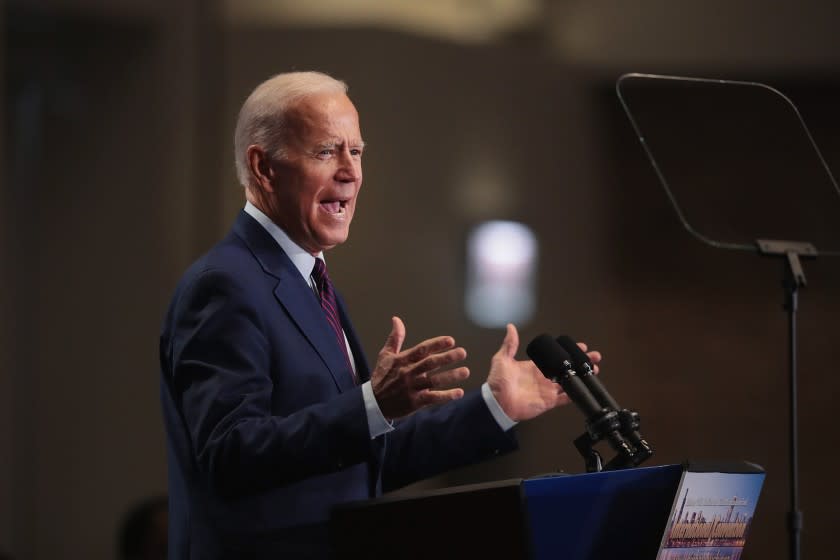Editorial: Biden's calm and steady acceptance caps a unifying Democratic convention

In accepting the Democratic presidential nomination, Joe Biden decisively debunked the accusation by President Trump that he is “sleepy” or mentally impaired. His speech may not have been soaring oratory, but it was a self-assured and sobering address. It combined a withering indictment of the man he referred to disdainfully as "the current occupant of the White House" with a promise to "choose hope over fear, facts over fiction, fairness over privilege."
Biden's overarching emphasis was on the urgency of replacing a president who has "cloaked America in darkness for much too long" and failed to deal competently with a pandemic that has upended the economy. Character, compassion and decency, he said, were on the ballot; much of the convention had been spent demonstrating those qualities in Biden. Invoking Franklin Delano Roosevelt, he also promised to harness the power of government to improve the lives of Americans, including young people who know only an America of rising inequality.
The former vice president thus evoked the two themes of the party's virtual convention. One was the moral and political imperative of ending the misrule of the ever more unhinged and erratic incumbent. The other was a commitment to tackle racial and economic inequities that have been thrown into shocking relief by the coronavirus pandemic.
In addition to devoting substantial airtime to portraying Biden as an empathetic, honorable figure — the anti-Trump — Democrats used the convention to deliver a pair of messages to the two flanks of the party. For younger and more progressive voters, there were powerful pronouncements about the importance of voting and the need to confront systemic racism and income inequality, along with the inclusive pitch by Sen. Kamala Harris (D-Calif.), Biden’s running mate, who spoke of a “beloved community — where all are welcome, no matter what we look like, where we come from, or who we love."
For older voters, there were reassurances — including from John Kasich, the former Republican governor of Ohio and 2016 presidential candidate — that Biden isn’t a fire-breathing radical. Alluding to one of specters raised by the Trump campaign, Kasich said that while some "fear Joe may turn sharp left and leave them behind," he didn't believe that "because I know the measure of the man."
There is admittedly some tension between these two messages — a return to normalcy and a new progressivism — but the party was right to try to harmonize them and it seems to have succeeded. The 2016 Democratic convention was haunted by the resentment that supporters of Sen. Bernie Sanders felt about a nominating process they thought was rigged in favor of Hillary Clinton. The party seemed much more unified this week.
An obvious reason for solidarity is the knowledge about what another four years of Trump the White House would mean for the country. In a devastating dissection of Trump’s presidency, former President Obama said in his speech to the convention that Trump has “shown no interest in putting in the work; no interest in finding common ground; no interest in using the awesome power of his office to help anyone but himself and his friends.”
Biden made that point even more bluntly in his acceptance speech: "What we know about this president is if he’s given four more years, he’ll be what he’s been for the last four years, a president who takes no responsibility, refuses to lead, blames others, cozies up to dictators and fans the flames of hate and division.”
But Biden also benefits from a decision to move closer to positions championed by the party’s progressives. He may not have embraced Sanders’ signature proposal, Medicare for all, but as the Vermont senator acknowledged, Biden “has a plan that will greatly expand healthcare and cut the cost of prescription drugs.”
Beyond healthcare, Sanders noted, Biden has endorsed a $15 minimum wage and 12 weeks of paid family leave. And in her speech to the convention, Sen. Elizabeth Warren of Massachusetts, another stalwart of the party’s progressive wing, noted that Biden also has committed to making child care affordable for every family.
Even as he promised to push for these and other progressive policies, Biden has made it clear that he isn't endorsing every agenda item of the party’s left wing. And, like the four-day convention, Biden's speech was light on policy specifics; the emphasis was on goals and values, not how to achieve them.
That won’t prevent Trump from ascribing to Biden positions he has never taken and accusing his campaign of being a Trojan Horse for city-burning, police-defunding socialists. On Thursday, Trump said that Biden is “a puppet of the radical left movement that seeks to destroy the American way of life.”
In his acceptance speech, Biden convincingly portrayed himself as both a progressive innovator and an advocate of civility and compromise. In the coming campaign Trump can be counted on to twist Biden’s words and actions in a desperate attempt to cling to an office he has disgraced. Biden and his fellow Democrats effectively used their convention to tell voters who their nominee actually is, but as the campaign moves forward, he will need a united party to keep reminding them.

